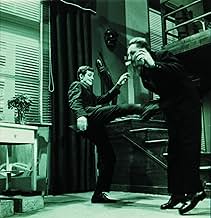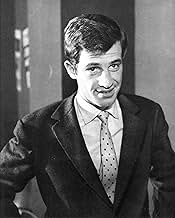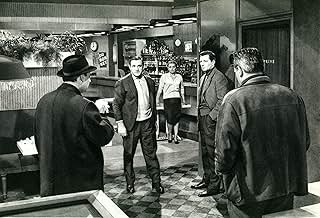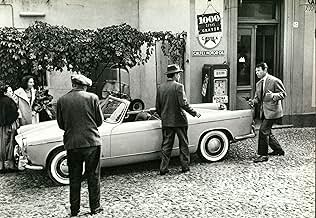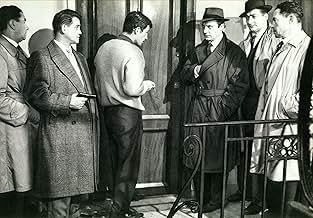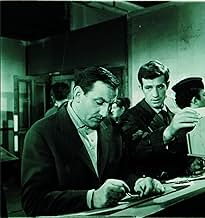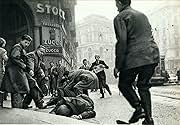IMDb-BEWERTUNG
7,5/10
4813
IHRE BEWERTUNG
Abel Davos will wieder zurück in sein Heimatland Frankreich fliehen. Außerdem begleitet ihn sein Freund Raymond. Die beiden Gangster wurden in Italien zum Tode verurteilt und sie erhoffen si... Alles lesenAbel Davos will wieder zurück in sein Heimatland Frankreich fliehen. Außerdem begleitet ihn sein Freund Raymond. Die beiden Gangster wurden in Italien zum Tode verurteilt und sie erhoffen sich in Frankreich vergessen worden zu sein.Abel Davos will wieder zurück in sein Heimatland Frankreich fliehen. Außerdem begleitet ihn sein Freund Raymond. Die beiden Gangster wurden in Italien zum Tode verurteilt und sie erhoffen sich in Frankreich vergessen worden zu sein.
Simone Desmaison
- Thérèse Davos
- (as Simone France)
Jean-Pierre Zola
- Le patron de l'agence privée
- (as J.P. Zola)
Philippe March
- Jean Martin
- (as Aimé de March)
Empfohlene Bewertungen
10Dziga7
I saw this film at Telluride Film Festival in 1997, where one of the screenwriters, José Giovanni, was being honored. It ranks highly as a great noir-crime-drama, incredible performances by Belmondo and Lino Ventura. The attention given to every character, and complex psychological portrayals, detailing loyalty, treachery, love, and hope, are tremendous. It is an excellent drama, an excellent thriller, and an excellent film. Up there with the best of Melville. (The title in English 'Class all risk,' in French 'Classe tous risques' is word-play on 'Classe Touriste,' meaning 'Tourist Class'.
Both Bresson and Melville are reputed to be big fans of "Classe Tous Risques" and it's easy to see why; either man could have directed this classic French gangster picture. The actual director was Claude Sautet and it's one of the greatest second films in movie history, (in the 15 year period between 1956 and 1970 Sautet made only 4 films). He made this one in 1960 around the time of the New Wave and while it's more traditional than something Godard or Truffaut might have done, nevertheless Sautet brings to it a freshness of approach that other gangster pictures of the period seem to lack. From the absolutely stunning opening sequence it's clear that this film will be infused with a good dose of existential angst as well as the requisite thrills that a really good gangster movie needs.
Two fugitives, (Lino Ventura and Stan Krol), have decided it's time to get out of Italy and back to France as the net closes in around them but they need money. They commit a foolhardy, though daring, daylight robbery and go on the run. This opening and the chase that follows is as good as anything in crime movies. The money they make, however, is hardly enough to sustain them, (Ventura has a wife and two sons to support), so they must rely on a network of friends and criminal associates and men on the run, already operating on the very edge, need all the friends they can get, however untrustworthy they may be and these guys friends prove to be very untrustworthy indeed but when tragedy strikes Ventura seems to have no option.
With the possible exceptions of Dassin's "Rififi" and several of Jean-Pierre Melville's classic gangster pictures this remains one of the greatest of genre films and is all the better for being, fundamentally, a low-key character piece. Ventura is perfect as the world-weary thief who would really rather just settle down and raise his family and he is matched by a young Jean-Paul Belmondo as the stranger who becomes his only real friend and ally. The brilliant black and white cinematography is by Ghislain Cloquet, (it was shot largely on location), and it is beautifully adapted by Sautet, Pascal Jardin and Jose Giovanni from Giovanni's novel.
Two fugitives, (Lino Ventura and Stan Krol), have decided it's time to get out of Italy and back to France as the net closes in around them but they need money. They commit a foolhardy, though daring, daylight robbery and go on the run. This opening and the chase that follows is as good as anything in crime movies. The money they make, however, is hardly enough to sustain them, (Ventura has a wife and two sons to support), so they must rely on a network of friends and criminal associates and men on the run, already operating on the very edge, need all the friends they can get, however untrustworthy they may be and these guys friends prove to be very untrustworthy indeed but when tragedy strikes Ventura seems to have no option.
With the possible exceptions of Dassin's "Rififi" and several of Jean-Pierre Melville's classic gangster pictures this remains one of the greatest of genre films and is all the better for being, fundamentally, a low-key character piece. Ventura is perfect as the world-weary thief who would really rather just settle down and raise his family and he is matched by a young Jean-Paul Belmondo as the stranger who becomes his only real friend and ally. The brilliant black and white cinematography is by Ghislain Cloquet, (it was shot largely on location), and it is beautifully adapted by Sautet, Pascal Jardin and Jose Giovanni from Giovanni's novel.
A discovery. Made in 1960, at the peak of the French New Wave, 'Classe Tous Risques' is a classic gangsters movie, directed by Claude Sautet, the screen adaptation of a novel by José Giovanni. Like many other filmmakers who began their careers during the New French Wave, Sautet and Giovanni, even though they did not belong to the current, became known both as directors and screenwriters of many films of this genre, a genre which a few years later will draw the attention of some of the most famous directors of the New Wave such as Melville or Chabrol. The film brings together on the same screen two of the actors specializing in tough guys roles in French films noir. Lino Ventura was already a well-known actor, while Jean-Paul Belmondo was building up his fame and full of creative hunger. In that year 1960 his name appeared on the credits of no less than eight films. The presence of Ventura and Belmondo, who on the screen as in reality played the roles of master and disciple is just one of the arguments that make 'Classe Tous Risques' a film worth seeing 60 years after its premiere.
Many films had already been made about the 'code of honor' of the underworld, and more would follow. Let's put aside the moral judgments about the 'honor' of those who rob, kill each other or kill innocent people in cold blood, but otherwise they are good familist and people capable of falling in love. Let's admit that the theme is an excellent starting point or core subject for thriller novels and films noir. This is also the case with the story of gangster Abel Davos (Lino Ventura), sentenced to death and pursued by all police of Europe, whose wife is killed when they try to return to France, who is betrayed by his old friends in crime and thus left to fight for survival with his two 8- and 4-year-old boys in her care. The help comes from Eric Stark (Jean-Paul Belmondo), a young gangster in the making, for whom Davos was kind of a moral model, precisely because of his respect for the mob codes of honor. The connection between the two (friendship, master - disciple) is the axis of the film.
Lino Ventura acts wonderfully in a type of role in which he specialized in those years, the tough guy followed by everyone who carries a gun, and whose chances of surviving until 'Fin' appears on the screen are low. He is however surpassed, I believe, in this film by Jean-Paul Belmondo, who manages to give a positive touch to his role, with the help of Sandra Milo as the young actress with whom Eric begins a relationship that may be his chance not to repeat the fate of Abel . The filming has rhythm and fluency, the characters are believable and the action flows interestingly until the final part, which confronts us with a less common ending for films of this genre, perhaps inspired by docu-novels that were also in vogue in those years. It's worth, I think, to see the movie and get to the end to judge by yourselves.
Many films had already been made about the 'code of honor' of the underworld, and more would follow. Let's put aside the moral judgments about the 'honor' of those who rob, kill each other or kill innocent people in cold blood, but otherwise they are good familist and people capable of falling in love. Let's admit that the theme is an excellent starting point or core subject for thriller novels and films noir. This is also the case with the story of gangster Abel Davos (Lino Ventura), sentenced to death and pursued by all police of Europe, whose wife is killed when they try to return to France, who is betrayed by his old friends in crime and thus left to fight for survival with his two 8- and 4-year-old boys in her care. The help comes from Eric Stark (Jean-Paul Belmondo), a young gangster in the making, for whom Davos was kind of a moral model, precisely because of his respect for the mob codes of honor. The connection between the two (friendship, master - disciple) is the axis of the film.
Lino Ventura acts wonderfully in a type of role in which he specialized in those years, the tough guy followed by everyone who carries a gun, and whose chances of surviving until 'Fin' appears on the screen are low. He is however surpassed, I believe, in this film by Jean-Paul Belmondo, who manages to give a positive touch to his role, with the help of Sandra Milo as the young actress with whom Eric begins a relationship that may be his chance not to repeat the fate of Abel . The filming has rhythm and fluency, the characters are believable and the action flows interestingly until the final part, which confronts us with a less common ending for films of this genre, perhaps inspired by docu-novels that were also in vogue in those years. It's worth, I think, to see the movie and get to the end to judge by yourselves.
The film Classe tous risques directed by Claude Sautet was not a film, to be honest, I had ever really heard of until the Film Forum in NYC said that they would have a 2-week screening of the film, with new English subtitles. When I also read that it was in the vein of the classic French crime films ala Jean Pierre Melville, I jumped at the chance to check it out (at best it would rank up with his great works, and at worst I would get some good popcorn in a great theater). It was well worth the admission, as Classe tous risques is one of those kinds of French films that is just waiting to be re-discovered (or discovered for the first time). With terrific, tense diligence, Sautet keeps the suspense at a tight pitch for the first forty minutes of the film, keeping a good (if not great) middle section, and then ending it up with what is always expected with these films, but with fascinating motivations by way of the characters. With a film in the vein of this sort, you know how it will end, but it's the cool, observant journey that counts.
The film features a performance with some real truth and honesty, amid the "old-school" criminal's code, by Lino Ventura as Aldo, who at the start of the film (one of the best beginnings to a film in this genre and country) steals a hefty amount of money with his partner in crime). When there is a sudden, ugly twist of fate on a beach late one night, Aldo is again on the run with two little kids. He gets the aid of Eric Stark (Jean-Paul Belmondo, a role in tune with Le Doulos only with a smidgen more humanity and charisma), who is also a thief and drives him into Paris. But there are some problems with some of Aldo's old business partner's, and one old score may be just the right ticket. A couple of times the plot may seem to be leisurely, but it isn't. Like Melville, Sautet doesn't allow any fat to his story, and it's a very tightly structured film, with some good doses of humor here and there (I was sometimes grinning at the audacity of the criminals in the beginning chase sequence, and also with a particular woman who had a finicky thing with her cat and a fish).
Along with a fine score by the great George Delerue, exceptional cinematography, and a mood that is seldom met let alone matched now adays, Classe tous risques is a reminder of that bridge between the real old-school film-noir, and the latter day crime films. Gangsters in these new sort of "thug-life" movies have a 1000th of the class and honor of the thieves in this film, and is a second banana to the works of Melville and Jules Dassin (a compliment I assure you). That it has a good realistic, moral edge helps as well.
The film features a performance with some real truth and honesty, amid the "old-school" criminal's code, by Lino Ventura as Aldo, who at the start of the film (one of the best beginnings to a film in this genre and country) steals a hefty amount of money with his partner in crime). When there is a sudden, ugly twist of fate on a beach late one night, Aldo is again on the run with two little kids. He gets the aid of Eric Stark (Jean-Paul Belmondo, a role in tune with Le Doulos only with a smidgen more humanity and charisma), who is also a thief and drives him into Paris. But there are some problems with some of Aldo's old business partner's, and one old score may be just the right ticket. A couple of times the plot may seem to be leisurely, but it isn't. Like Melville, Sautet doesn't allow any fat to his story, and it's a very tightly structured film, with some good doses of humor here and there (I was sometimes grinning at the audacity of the criminals in the beginning chase sequence, and also with a particular woman who had a finicky thing with her cat and a fish).
Along with a fine score by the great George Delerue, exceptional cinematography, and a mood that is seldom met let alone matched now adays, Classe tous risques is a reminder of that bridge between the real old-school film-noir, and the latter day crime films. Gangsters in these new sort of "thug-life" movies have a 1000th of the class and honor of the thieves in this film, and is a second banana to the works of Melville and Jules Dassin (a compliment I assure you). That it has a good realistic, moral edge helps as well.
I have just watched on Italian TV the excellent crime drama CLASSE TOUS RISQUES (1960; aka: THE BIG RISK), directed by Claude Sautet and starring the late Lino Ventura (in one of his best roles) and a very young Jean-Paul Belmondo.
This film came out at the tail end of a string of French gangster thrillers of the 50s, the most famous of which was, of course, Jules Dassin's seminal DU RIFIFI CHEZ LES HOMMES (1954; aka: RIFIFI). I haven't watched RIFIFI in a long time but I plan to acquire the Criterion DVD some time or other. In fact, I have only postponed it, really, because of the reported audio-synch problem present on the disc's first pressings and, being a non-U.S. resident, Criterion's policy dictates that no defective discs delivered outside Region 1 territories can be replaced! Still, in light of THE BIG RISK, I may risk it [sic] all the same!
When the film came out it converged with a spate of Nouvelle Vague releases including Jean-Luc Godard's A' BOUT DE SOUFFLE (1960; aka: BREATHLESS) starring, of course, Jean-Paul Belmondo himself. It is easy to assume that his characterization in THE BIG RISK is nowhere near as iconic as his Laszlo Kovacs in Godard's film, but after all his is a supporting role (albeit pulled off with confidence and charm) and he is all too obviously overshadowed by the underrated Ventura, who dominates the film from beginning to end. Ventura was a regular in gangster films of the period: he was in Jacques Becker's masterful TOUCHEZ PAS AU GRISBI (1953; aka: HANDS OFF THE LOOT!) playing the main villainous role and in which he conducts an effective vis-à-vis with nominal star Jean Gabin, but he then took the lead for Jean-Pierre Melville's magnificent thriller set in WWII, L'ARMEE' DES OMBRES (1969; aka: ARMY OF SHADOWS).
Incidentally, next week Criterion will release Melville's BOB LE FLAMBEUR (1955) and I hope they can put their hands on other films by this French master, notably LES ENFANTS TERRIBLES (1950), from the play by Jean Cocteau; LE DEUXIEME SOUFFLE (1966; aka: SECOND BREATH), also starring Lino Ventura; LE SAMOURAI (1967), his undisputed chef d'oeuvre; the aforementioned L'ARMEE' DES OMBRES and LE CERCLE ROUGE (1970; aka: THE RED CIRCLE). It is worth noting that the last two may very well be future Criterion DVDs. For the record, I have recorded ENFANTS, SAMOURAI, ARMEE' and CERCLE (which I have yet to watch) off French TV, along with the atypical LEON MORIN, PRETRE (1961) and the little-seen LE DOULOS (1962; aka: THE FINGER MAN), both of which star Jean-Paul Belmondo.
To go back to THE BIG RISK, it was dismissed at the time as old-fashioned in light of the Nouvelle Vague, though the few stylistic touches it has are effective exactly because they are sparse and unexpected. After an explosive start, the film relaxes its grip for the first half in order to establish plot (somewhat unusual in its emphasis on the domestic problems of gangsters) and characterization (particularly in eliciting audience sympathy for the lone anti-hero). The plot does have its improbable turns: for example, Belmondo's and Sandra Milo's characters are a bit too good to be true, aiding Ventura without batting an eyelid (despite the obvious danger involved) just minutes after making his acquaintance, while the ending is a bit of a letdown (the film is abruptly interrupted and the plot resolved with a hurried voice-over explanation)...but Ventura's solid performance as a man betrayed, quietly desperate at first but driven eventually to sudden eruptions of violence, holds the film firmly together and makes THE BIG RISK a classic of its kind.
Other films by Claude Sautet I have watched are LES CHOSES DE LA VIE (1969), MAX ET LES FERRAILLEURS (1971; aka: MAX AND THE SCRAP-MONGERS), CESAR ET ROSALIE (1972), all on Italian TV, and VINCENT, FRANCOIS, PAUL ET LES AUTRES (1974), which I have recorded off French TV. All of these are low-key yet very interesting and thought-provoking films, aided a great deal by a superb selection of actors (Michel Piccoli in CHOSES, MAX and VINCENT; Romy Schneider in the first three titles; and Yves Montand in the last two). VINCENT, FRANCOIS, PAUL ET LES AUTRES is perhaps Sautet's best film: it co-stars Serge Reggiani, Gerard Depardieu (one of his first), Marie Dubois and Stephane Audran (an extended cameo, really, but effective nonetheless).
As I have said, I wish that some of the films I mentioned by Claude Sautet and Jean-Pierre Melville, including of course THE BIG RISK, will one day be released on DVD. Supplements for such films may be hard to come by, I guess, but a quality print in the Original Aspect Ratio with a transfer to match are the least we could expect for them. I know that some of the above-mentioned films are already available on French Region 2 DVD but unfortunately most of them do not carry English subtitles. Although I do have quite a basic knowledge of the French language, I am still not fluent enough to get by without any subtitles. However, I would very much like to read your opinions of French Region 2 DVDs and will affect a search through the Mobius archives for that purpose, though I may still have to post my queries about particular French DVDs which I am interested in purchasing in a new thread in this Forum in the near future.
This film came out at the tail end of a string of French gangster thrillers of the 50s, the most famous of which was, of course, Jules Dassin's seminal DU RIFIFI CHEZ LES HOMMES (1954; aka: RIFIFI). I haven't watched RIFIFI in a long time but I plan to acquire the Criterion DVD some time or other. In fact, I have only postponed it, really, because of the reported audio-synch problem present on the disc's first pressings and, being a non-U.S. resident, Criterion's policy dictates that no defective discs delivered outside Region 1 territories can be replaced! Still, in light of THE BIG RISK, I may risk it [sic] all the same!
When the film came out it converged with a spate of Nouvelle Vague releases including Jean-Luc Godard's A' BOUT DE SOUFFLE (1960; aka: BREATHLESS) starring, of course, Jean-Paul Belmondo himself. It is easy to assume that his characterization in THE BIG RISK is nowhere near as iconic as his Laszlo Kovacs in Godard's film, but after all his is a supporting role (albeit pulled off with confidence and charm) and he is all too obviously overshadowed by the underrated Ventura, who dominates the film from beginning to end. Ventura was a regular in gangster films of the period: he was in Jacques Becker's masterful TOUCHEZ PAS AU GRISBI (1953; aka: HANDS OFF THE LOOT!) playing the main villainous role and in which he conducts an effective vis-à-vis with nominal star Jean Gabin, but he then took the lead for Jean-Pierre Melville's magnificent thriller set in WWII, L'ARMEE' DES OMBRES (1969; aka: ARMY OF SHADOWS).
Incidentally, next week Criterion will release Melville's BOB LE FLAMBEUR (1955) and I hope they can put their hands on other films by this French master, notably LES ENFANTS TERRIBLES (1950), from the play by Jean Cocteau; LE DEUXIEME SOUFFLE (1966; aka: SECOND BREATH), also starring Lino Ventura; LE SAMOURAI (1967), his undisputed chef d'oeuvre; the aforementioned L'ARMEE' DES OMBRES and LE CERCLE ROUGE (1970; aka: THE RED CIRCLE). It is worth noting that the last two may very well be future Criterion DVDs. For the record, I have recorded ENFANTS, SAMOURAI, ARMEE' and CERCLE (which I have yet to watch) off French TV, along with the atypical LEON MORIN, PRETRE (1961) and the little-seen LE DOULOS (1962; aka: THE FINGER MAN), both of which star Jean-Paul Belmondo.
To go back to THE BIG RISK, it was dismissed at the time as old-fashioned in light of the Nouvelle Vague, though the few stylistic touches it has are effective exactly because they are sparse and unexpected. After an explosive start, the film relaxes its grip for the first half in order to establish plot (somewhat unusual in its emphasis on the domestic problems of gangsters) and characterization (particularly in eliciting audience sympathy for the lone anti-hero). The plot does have its improbable turns: for example, Belmondo's and Sandra Milo's characters are a bit too good to be true, aiding Ventura without batting an eyelid (despite the obvious danger involved) just minutes after making his acquaintance, while the ending is a bit of a letdown (the film is abruptly interrupted and the plot resolved with a hurried voice-over explanation)...but Ventura's solid performance as a man betrayed, quietly desperate at first but driven eventually to sudden eruptions of violence, holds the film firmly together and makes THE BIG RISK a classic of its kind.
Other films by Claude Sautet I have watched are LES CHOSES DE LA VIE (1969), MAX ET LES FERRAILLEURS (1971; aka: MAX AND THE SCRAP-MONGERS), CESAR ET ROSALIE (1972), all on Italian TV, and VINCENT, FRANCOIS, PAUL ET LES AUTRES (1974), which I have recorded off French TV. All of these are low-key yet very interesting and thought-provoking films, aided a great deal by a superb selection of actors (Michel Piccoli in CHOSES, MAX and VINCENT; Romy Schneider in the first three titles; and Yves Montand in the last two). VINCENT, FRANCOIS, PAUL ET LES AUTRES is perhaps Sautet's best film: it co-stars Serge Reggiani, Gerard Depardieu (one of his first), Marie Dubois and Stephane Audran (an extended cameo, really, but effective nonetheless).
As I have said, I wish that some of the films I mentioned by Claude Sautet and Jean-Pierre Melville, including of course THE BIG RISK, will one day be released on DVD. Supplements for such films may be hard to come by, I guess, but a quality print in the Original Aspect Ratio with a transfer to match are the least we could expect for them. I know that some of the above-mentioned films are already available on French Region 2 DVD but unfortunately most of them do not carry English subtitles. Although I do have quite a basic knowledge of the French language, I am still not fluent enough to get by without any subtitles. However, I would very much like to read your opinions of French Region 2 DVDs and will affect a search through the Mobius archives for that purpose, though I may still have to post my queries about particular French DVDs which I am interested in purchasing in a new thread in this Forum in the near future.
Wusstest du schon
- WissenswertesCo-writer/Director Claude Sautet said after the shooting that he did not know that the Abel Davos - Danos - character was inspired by a gangster who collaborated with the Nazis against French resistance and Jews during German occupation.
- Zitate
Eric Stark: The best thing about me is my left hook.
- VerbindungenFeatured in Claude Sautet oder Die unsichtbare Magie (2003)
Top-Auswahl
Melde dich zum Bewerten an und greife auf die Watchlist für personalisierte Empfehlungen zu.
- How long is The Big Risk?Powered by Alexa
Details
- Erscheinungsdatum
- Herkunftsländer
- Offizieller Standort
- Sprachen
- Auch bekannt als
- The big Risk - Volles Risiko
- Drehorte
- Produktionsfirmen
- Weitere beteiligte Unternehmen bei IMDbPro anzeigen
Box Office
- Bruttoertrag in den USA und Kanada
- 132.928 $
- Eröffnungswochenende in den USA und in Kanada
- 11.945 $
- 20. Nov. 2005
- Weltweiter Bruttoertrag
- 132.928 $
- Laufzeit1 Stunde 45 Minuten
- Farbe
- Seitenverhältnis
- 1.66 : 1
Zu dieser Seite beitragen
Bearbeitung vorschlagen oder fehlenden Inhalt hinzufügen




